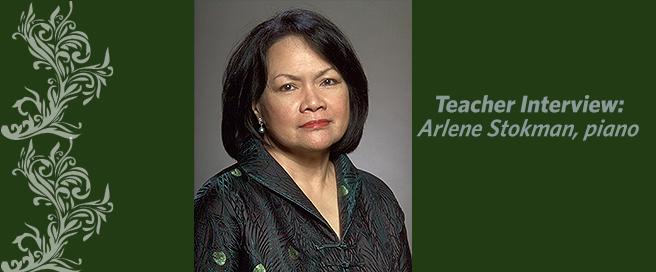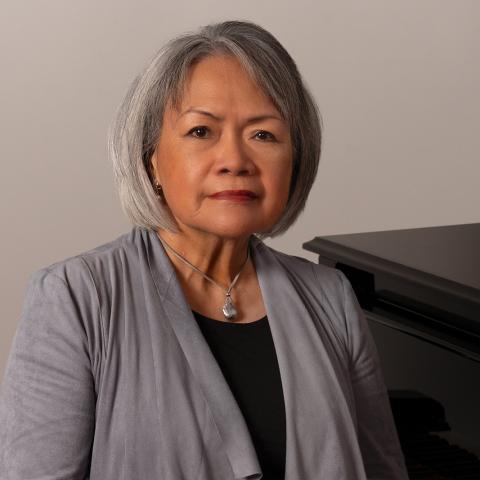Teacher Spotlight: Arlene Stokman, piano

October 4th, 2014
Teacher Spotlight: Arlene Stokman, piano
By Erin Cano
Arlene Stokman joined MIC as a Suzuki piano instructor in 1984.
What led you to become a Suzuki instructor?
I love children and I am fascinated by how they learn. I have always maintained a studio of young students even when I was teaching in the college level. This allowed me to observe the different stages of learning first hand. I saw the possible source of the technical and musical problems that my adult students were experiencing.
After six years of teaching, I quit my university job to start a family. My husband Abe is a wonderful pianist and musician, so music is very important in our home; just as important as the air we breathe and the food we eat. Our children, Alexandra and David, grew up in this environment and both learned how to play the piano as soon as they were able to reach the keys. However it was David who, at the age of 3, showed a need for formal instruction. As I started to teach him traditionally, I found it so unnatural to teach him note-reading when his facility to play exceeded his ability to read. This led to frustration because the note-reading was holding him back. At the age of 3, he wasn’t even reading books. I had heard of the Suzuki method and the success it had with very young children, so I decided to learn more about it. I went for my teacher training with Lorraine Landefeld, and she gave me a very good and convincing exposure to the method. The mother tongue approach enhanced with positive reinforcement made so much more sense. She was very adamant on the importance of tone production even for beginners and this appealed to me as a musician.
I have been teaching Suzuki piano ever since, and I love it because it is so child-oriented. Parent participation is very important. The child, parent and teacher form a “trio” that works towards a common goal: the success of the child. Success means the child is patiently guided to work and develop his ability to play the instrument, giving him confidence in the process, patience in working through any limitations, and the sheer enjoyment of the music he has produced. The parent is able to watch the success and failures their child goes through in the process of learning and is given the opportunity to patiently help them work through any challenges they may encounter. This creates a very strong bond between parent and child, making this such a wonderful gift for the family unit. So many families throughout the world are forever grateful to Dr. Shinichi Suzuki for this life-changing method.
What is your favorite Suzuki piece to teach?
My favorite piece would be whatever I am teaching at the moment. Each piece is an opportunity to teach a concept, technique, or skill, building up to the ability of making music.
Which of your teachers inspired you the most? What aspects of their teaching have you integrated into your own style?
I was four years old when I started piano lessons spurred by my own curiosity and insistence after a chance encounter with a piano at my godmother’s house. I am very sorry to say that none of my beginning teachers really stand out in my mind. Actually, it is a blessing that some of them were not successful in ruining my love for the piano. During this stage of my studies, none of them ever mentioned music as a means of self-expression. My own mother who didn’t have any musical background was the one who told me that music should describe life. At that time, I thought she didn’t know what she was talking about because none of my teachers ever mentioned this. That is probably why I teach children, because I feel the need of a quality musical beginning for them.
I took my Bachelors of Music degree at the University of Santo Tomas, Philippines, where I studied with Bernardino Custodio. He was a superb technician who believed that a solid and reliable technique will enable one to express music more freely. I fully agree with him. Until then, my relationship with the piano was very superficial. It came easily to me and I had a flair for it, so it was an easy degree for me to get. Then I studied with Benjamin Tupas, a former student of Myra Hess. He opened a whole new world of music for me; a world of sound, nuances and color. That was when I really fell in love with the piano. I had never worked so hard in my whole life, and the piano became a passion. Unfortunately he got seriously ill, so I decided to pursue my masters at the Chicago Musical College of Roosevelt University. I studied with Abraham Stokman who continued my study of sound, and from him, I learned a lot about the different styles of music.
For my Suzuki training, I am grateful to Lorraine Landefeld for giving me a good start and to Mary Craig Powell, who encompasses all the qualities of a good teacher. And of course my students have taught me a lot through the years. Teaching them has kept my mind continually sharp and challenged.
Do you play any other instruments beside the piano? If not, what other instrument would you like to be able to play?
I don’t play any other instruments, but I would love to be able to sing well because it is the most direct musical experience. Since I have not been blessed with a good vocal “instrument”, I would like to play the saxophone.
What do you enjoy doing in your free time?
I love to read, listen to music, cook, bake, sew, garden, and much more….as time permits.

